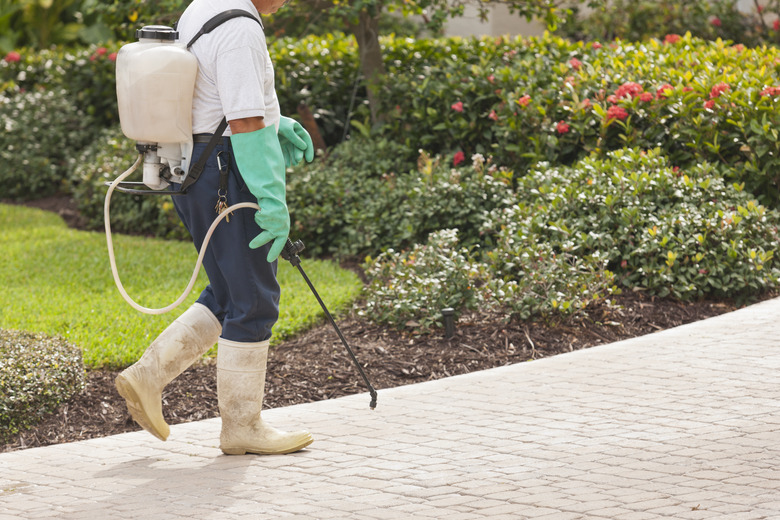Are Pest Control Services Safe For Pets? Here's What You Need To Know
We may receive a commission on purchases made from links.
Nobody wants a house filled with pests — especially pests like rats, mosquitoes, cockroaches, and fleas, which may pose a threat to the safety of a family, including pets. At the same time, homeowners with furry friends need to ensure that any home pest control they use is safe for pets, which is why it pays to be wary before using any type of pest control product in your home.
If you're working with a professional pest control company, don't be afraid to ask about what products and methods it uses and how this may affect your dogs or cats. If you are going the DIY route, always familiarize yourself with the active ingredient of the product and how the product works and be sure to follow the label directions to the letter.
Tip
Many pest control options are dangerous for pets, which is why it's important to fully evaluate your options before choosing the right pest control plan for your situation.
Avoid Using Rodent Poisons
Avoid Using Rodent Poisons
Avoid using any type of rodent poison when you have pets, as they present many dangers to your furry friends even if your pet can't get into the bait station. The reason why? These poisons are particularly designed for use on mammals, unlike many other pesticides that are designed for insects.
Not only can the poison itself harm your pet but your pet may be tempted to eat a rodent that has consumed the poison. While dogs and cats rarely eat rats and mice that have already died, because these products take up to two days to kill rodents, it is always possible that your pet may catch a rat that has consumed the poison but has not yet died. Don't forget that even if the poison is stored in a bait station and your pet never encounters a dying rodent, the pests may scatter the poison outside the bait station.
If you have a severe infestation and believe rodent poisons may be the only solution to your problem, be sure to choose a poison with a well-known, readily available antidote. As an example, anticoagulants, such as bromadiolone or difethialone, can be treated with vitamin K1, whereas rodenticides that contain bromethalin or cholecalciferol do not have antidotes and can more easily kill house pets as a result. Be sure to place the poison in a bait station, which can at least limit how much your pet can get to at one time, and always place the bait station in an area your pet can't access.
Signs of exposure to rodenticides in pets varies depending on the specific poison but may include:
- Abdominal distension
- Vomiting
- Nonproductive retching
- Shock
- Collapse
- Tremors
- Seizures
- Loss of balance
- Paralysis
- Lethargy
- Poor appetite
- Weakness
- Pale gums
- Coughing
- Difficulty
breathing - Nosebleeds
- Bruising
- Bloody urine
- Bleeding gums.
If you notice these or any other troubling symptoms, take your pet to the vet as soon as possible.
Watch Out for Garden Insecticides
Watch Out for Garden Insecticides
Many homeowners who would be cautious when considering a professional pest control treatment on an infestation of rats, bedbugs, or termites in their home wouldn't think twice about using a DIY insecticide treatment to kill gnats, aphids, or other pests on the plants in their yard. However, many pesticides designed to eliminate insects are highly dangerous to pets:
- Organophosphates and carbamates are particularly
common in insect killer applications that are often mixed in with fertilizers
or herbicides. Pets who have been exposed to these poisons may suffer from excessive
salivation, runny eyes, uncontrolled urination, uncontrolled defecation, hypothermia,
hyperthermia, difficulty breathing, tremors, or seizures. - Imidacloprid, which is even used in commercial
flea treatments designed for pets, can be incredibly dangerous to animals when
used in commercial fertilizers with insecticides since pets may directly lick
the substance. Signs of exposure include excessive drooling, gastrointestinal
upset, muscle weakness, respiratory distress, shock, vomiting, tremors, ear
twitching, and poor coordination. - Metaldehyde and other molluscidides used to
treat snails and slugs are often mixed with bran or molasses to make them
more attractive to slugs and snails, which unfortunately makes them more
attractive to dogs as well. Ingestion of these poisons may result in vomiting,
anxiety, excessive salivation, hypersensitivity to touch,
muscle tremors, high fevers, rapid eye movement, lethargy, muscle weakness,
seizures, loss of consciousness, and trouble breathing.
The Dangers of Traps
The Dangers of Traps
Overall, traps present fewer dangers to pets than pesticides, but these pest control products still present hazards of their own. Paws and snouts can easily get caught in snap traps, skin and fur can get stuck on glue traps, and even live-capture traps can injure a curious dog or cat's paw if she gets caught in the mechanism.
When using any type of traps, whether on your own or when working with a pest control services company, always make sure they are placed out of your pet's reach. This could mean placing them in a shed, garage, or attic that your pet cannot access or putting the device inside a larger box that is secured from your animal but has a hole large enough for the intended target. While there are some safer self-enclosed traps these days, it is still best to keep these in a box or other area where curious pets won't be tempted to stick in their paws. Also keep in mind that trapped pests can still bite and claw you or your pet.
Don't make the mistake of thinking that glue traps are a safe alternative to snap traps. While these will not cause bone fractures or breaks like snap traps do, removing the glue from skin or fur is still highly difficult, and cats caught in glue traps often end up needing surgery. While fly strips suspended in the air are typically pet-friendly, always make sure they are properly secured and out of the reach of jumping cats or dogs who might think they look like toys.
Natural Doesn’t Always Mean Safe
Natural Doesn't Always Mean Safe
A lot of people assume that if they make their own pest repellent or poison at home with natural ingredients, it must be pet-safe. Unfortunately, that's simply not the case. As an example, boric acid, the active ingredient in borax, is highly effective at killing insects, such as ants and cockroaches, and is highly toxic to dogs and cats. Exposure to boric acid may result in eye irritation, skin irritation, vomiting, diarrhea, drooling, abdominal pain, excessive thirst, kidney damage, seizures, and death.
Even more concerning are some essential oils that are marketed as natural pest control options. Many of these are toxic to pets, especially when used in high concentrations. Tea tree oil is particularly dangerous to dogs and cats and can even cause liver failure and death. Always talk to a vet before using essential oils for pest control.
It's worth noting that even plants used as natural pest control can be toxic to pets, including citronella, marigolds, garlic lavender, chives, and mums. However, some plants can be incorporated into a pet-friendly pest control plan, including:
- Lemongrass,
which repels mosquitoes - Petunias, which scare
away tomato worms, aphids, squash bugs, and some beetles - Mint, which fends off mosquitoes
- Basil, which deters mosquitoes and flies
- Rosemary, which wards off flies and mosquitoes
- Catnip, which keeps away mosquitoes, cockroaches, flea beetles, and rats
- Lemon balm, which can keep
mosquitoes and gnats at bay
Finally, while diatomaceous earth is generally considered a pet-friendly pest control option and is highly effective against many insects, it does contain quite a bit of silica, which can be harmful when inhaled and may irritate the skin and eyes. So, it's still best to use diatomaceous earth away from areas where your pet frequents. Keep your pet away from treated areas and if your animal has a known respiratory problem, avoid using this product altogether. If you notice that your pet is sneezing or coughing or if he has runny eyes or hives after you've used diatomaceous earth, contact a vet.
References
- The Humane Society of the United States: Glue Boards
- Wilson's Garden Center: Herbs That Repel Bugs
- Embrace Pet Insurance: Rodenticide Toxicity
- Animal Humane Society: Pet-Friendly Mosquito Repellents (That Humans Can Use Too)
- Bug Tech: The Truth About Borax and Boric Acid
- Pet Poison Helpline: Organophosphates
- DVM360: 6 Pest Control Tips for Pet Owners
- Nebraska Extension: Protecting Your Cats and Dogs from Pesticide Poisoning


